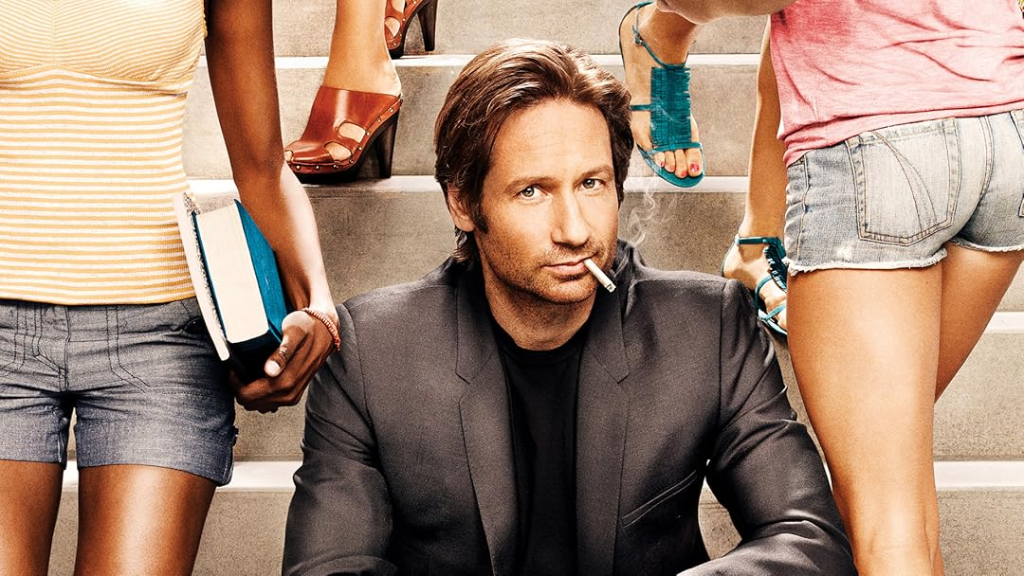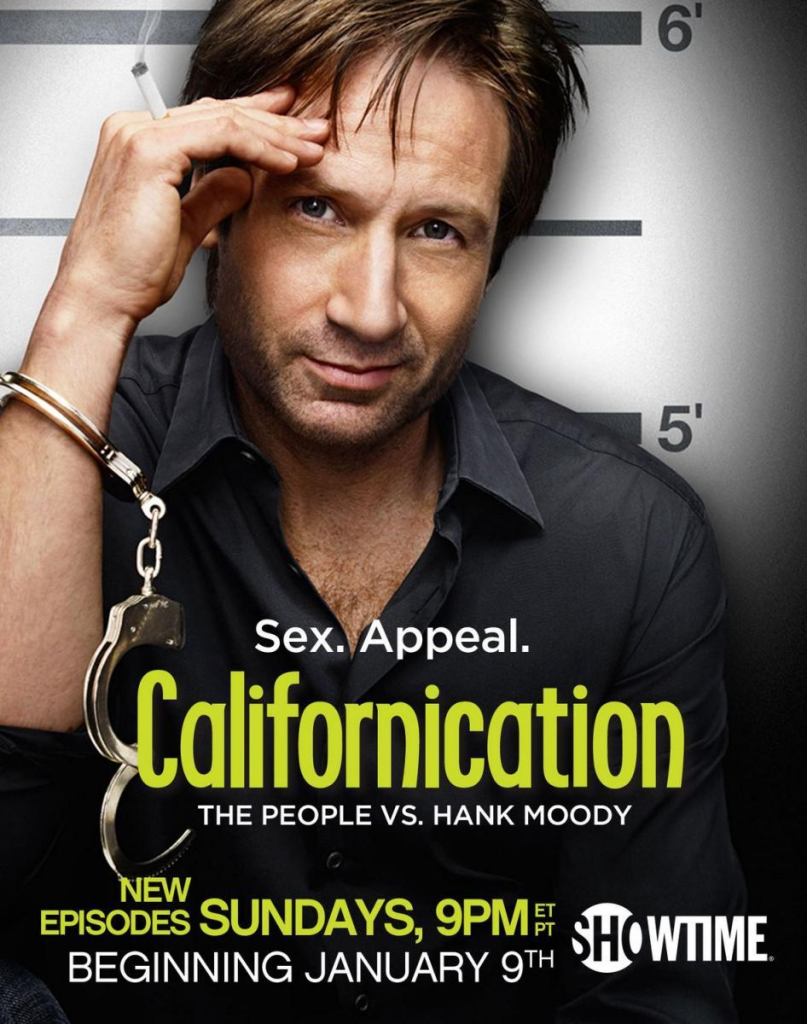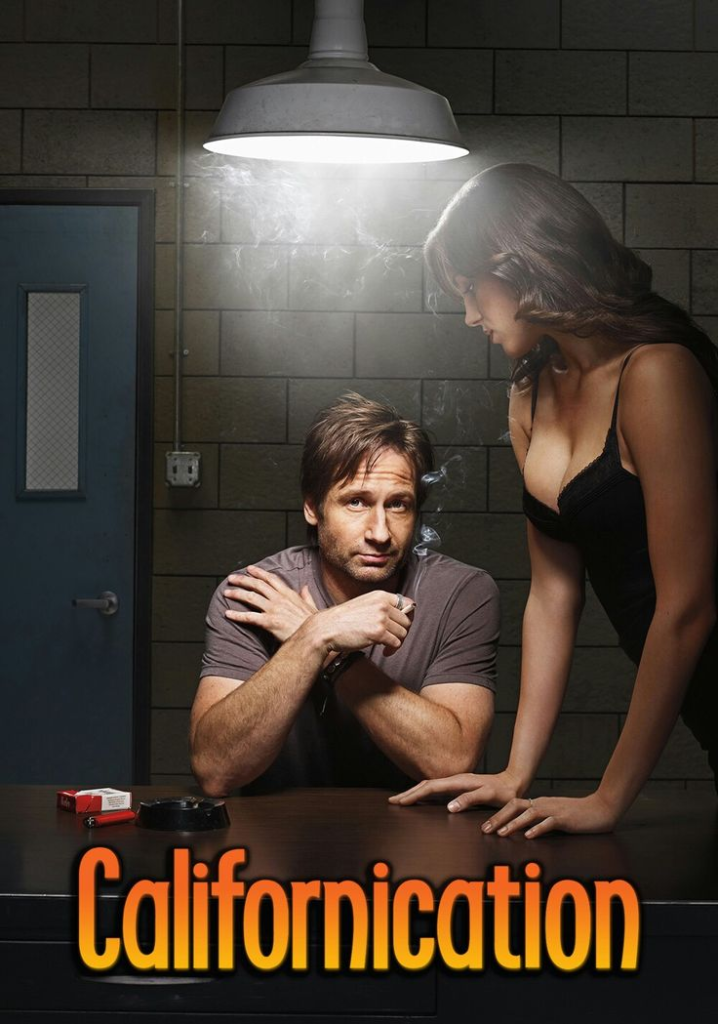Californication (2007)

Introducing Californication: The TV Series
Californication (2007–2014) is a provocative comedy-drama series that aired for seven seasons on Showtime, blending sharp wit, raw emotion, and unapologetic hedonism. Created by Tom Kapinos, the show follows Hank Moody, a troubled writer navigating sex, drugs, and relationships in Los Angeles while trying to reconnect with his ex-partner and daughter. Premiering on August 13, 2007, and concluding on June 29, 2014, the series stars David Duchovny in a career-defining role, supported by a dynamic ensemble. With its blend of raunchy humor, literary references, and heartfelt family drama, Californication carved a niche as a bold exploration of self-destruction and redemption in the glitzy underbelly of Hollywood. This article provides a comprehensive introduction to Californication, delving into its premise, cast, production, themes, reception, and lasting legacy..

Premise and Plot Overview
Californication centers on Hank Moody (David Duchovny), a New York novelist whose acclaimed book, God Hates Us All, has been adapted into a schmaltzy Hollywood film, A Crazy Little Thing Called Love. Struggling with writer’s block and a penchant for self-sabotage, Hank relocates to Los Angeles, where he spirals into a haze of casual sex, alcohol, and drugs. Despite his hedonistic lifestyle, Hank yearns to reconnect with Karen (Natascha McElhone), his ex-partner and the love of his life, and their teenage daughter, Becca (Madeleine Martin), who grapples with her father’s chaos.
The series unfolds as a character-driven dramedy, with each season chronicling Hank’s misadventures in LA’s music, film, and literary scenes. Season 1 introduces his attempts to win back Karen, who is engaged to Bill Lewis (Damian Young), while navigating temptations like Mia (Madeline Zima), a young woman with a dangerous secret. Subsequent seasons see Hank teaching at a college, working as a screenwriter, and tangling with eccentric characters like Lew Ashby (Callum Keith Rennie), a rock producer, and Atticus Fetch (Tim Minchin), a volatile musician. The narrative balances comedic escapades—bar brawls, awkward hookups—with poignant moments, as Hank confronts his flaws and fights for his family.
Over seven seasons and 84 episodes, Californication evolves from a sex-fueled satire to a deeper exploration of love and accountability, though Hank’s recidivism keeps the tone irreverent. The series concludes with a bittersweet resolution, tying up Hank’s journey while leaving room for interpretation.

Cast and Characters
Californication features a stellar cast that brings its flawed, vibrant characters to life:
- David Duchovny as Hank Moody: Duchovny delivers a charismatic, layered performance as Hank, blending charm, cynicism, and vulnerability. His portrayal makes Hank both infuriating and endearing, a rock star writer with a broken heart.
- Natascha McElhone as Karen: McElhone’s Karen is Hank’s moral anchor, a grounded architect whose love for him is tested by his chaos. Her nuanced performance adds emotional weight.
- Madeleine Martin as Becca Moody: Martin shines as Becca, evolving from a precocious preteen to a rebellious young adult, her relationship with Hank providing the show’s heart.
- Evan Handler as Charlie Runkle: Handler’s Charlie, Hank’s agent and best friend, is a comedic standout, navigating his own marital and professional missteps with Marcy (Pamela Adlon).
- Supporting Cast: Madeline Zima’s Mia, a manipulative seductress, and Pamela Adlon’s Marcy, Charlie’s fiery wife, add spice. Recurring players like Callum Keith Rennie, Tim Minchin, and Rob Lowe (as the unhinged Eddie Nero) bring memorable energy.
The ensemble’s chemistry, particularly Duchovny’s interplay with McElhone and Martin, grounds the show’s wilder moments, making the characters’ messy lives relatable.
Production and Filmmaking
Created by Tom Kapinos, Californication was produced by Showtime, with Duchovny serving as an executive producer alongside Kapinos, Stephen Hopkins, and others. Filmed primarily in Los Angeles, the series captures the city’s sun-soaked glamour and seedy underbelly, with locations like Venice Beach, Hollywood bars, and sprawling mansions setting the tone. Some scenes were shot in New York to reflect Hank’s roots, adding contrast.
The production excels in its lean, character-focused approach. Cinematographer Michael Barrett employs a warm, vibrant palette, evoking LA’s seductive allure, while directors like Adam Bernstein and John Dahl infuse episodes with a mix of gritty realism and playful energy. The soundtrack, featuring artists like The Rolling Stones, Warren Zevon, and Tommy Stinson, complements Hank’s rock-and-roll vibe, with the Red Hot Chili Peppers’ song “Californication” inspiring the title. Costume designer Peggy A. Schnitzer dressed Hank in signature T-shirts and jeans, reflecting his laid-back rebellion.
The series faced challenges with its explicit content, drawing early criticism for nudity and sex scenes, though Kapinos defended them as integral to Hank’s story. Production navigated Duchovny’s availability after his X-Files fame and balanced serialized arcs with episodic adventures, maintaining a 30-minute format that kept the pacing brisk.

Themes and Symbolism
Californication explores complex themes beneath its irreverent surface:
- Self-Destruction vs. Redemption: Hank’s cycle of indulgence and regret drives the narrative, examining whether a flawed person can change without losing their essence.
- Love and Family: The show’s core is Hank’s devotion to Karen and Becca, contrasted with his inability to resist temptation, highlighting the tension between desire and duty.
- Art and Authenticity: Hank’s disdain for Hollywood’s commercialization reflects broader questions about creative integrity, with his writer’s block symbolizing a loss of purpose.
- Masculinity and Excess: The series critiques toxic masculinity through Hank’s behavior, juxtaposing his charm with the consequences of his actions, particularly on Becca.
Symbolically, Los Angeles represents a seductive trap, its sunny veneer masking emptiness, while Hank’s Porsche, often breaking down, mirrors his stalled life. Books and music recur as motifs, tying Hank’s identity to his literary and rebellious roots.

Reception and Cultural Impact
Californication received mixed-to-positive reviews, earning a 57% approval rating on Rotten Tomatoes for Season 1, with later seasons averaging 60–70%. Critics praised Duchovny’s magnetic performance and the show’s sharp dialogue, with Variety calling it “a lusty, funny ride,” but some, like The New York Times, criticized its reliance on shock value and repetitive arcs. The series won a Golden Globe for Duchovny in 2008 and earned Emmy nominations for writing and cinematography.
Commercially, Californication was a hit for Showtime, averaging 1–2 million viewers per episode and boosting the network’s profile alongside Weeds and Dexter. It cultivated a loyal fanbase, particularly among viewers drawn to its blend of humor and heart, with online communities on Reddit and X debating Hank’s morality and the show’s provocative themes. The series influenced later dramedies like Shameless and Ray Donovan, blending raw comedy with emotional stakes.
Culturally, Californication sparked discussions about depictions of sex and gender in media, with some praising its frankness and others decrying its male-centric lens. It also popularized LA’s rock-literary subculture, with references to Charles Bukowski and Lou Reed resonating with fans. The show’s legacy includes inspiring fan fiction, podcasts, and a lasting appreciation for Duchovny’s post-X-Files reinvention.

Why Watch Californication?
Californication is a rollercoaster of laughs, lust, and longing, perfect for viewers who enjoy bold, character-driven stories. David Duchovny’s Hank Moody is a magnetic antihero, equal parts infuriating and lovable, supported by a stellar cast that brings LA’s chaotic allure to life. The show’s mix of raunchy comedy, literary wit, and family drama offers a unique flavor, appealing to fans of Entourage, Curb Your Enthusiasm, or BoJack Horseman. Its vibrant soundtrack and sunlit visuals make it a nostalgic snapshot of 2000s Hollywood excess.
While not for the faint of heart due to its explicit content, Californication rewards viewers with its emotional core—Hank’s quest to be a better man for Karen and Becca. Whether you’re drawn to the wild escapades or the tender moments, the series is a binge-worthy journey through one writer’s beautifully flawed life.

Conclusion
Californication is a daring, irreverent gem that ran from 2007 to 2014, leaving an indelible mark on television with its blend of comedy, drama, and raw humanity. Created by Tom Kapinos and led by David Duchovny’s unforgettable Hank Moody, the series captures the highs and lows of life in Los Angeles, from fleeting pleasures to enduring love. With its sharp writing, vibrant cast, and unapologetic storytelling, Californication remains a touchstone for fans of provocative dramedies. As Hank navigates the City of Angels, the show invites viewers to laugh, cringe, and root for redemption in a world where everyone’s a little lost.
